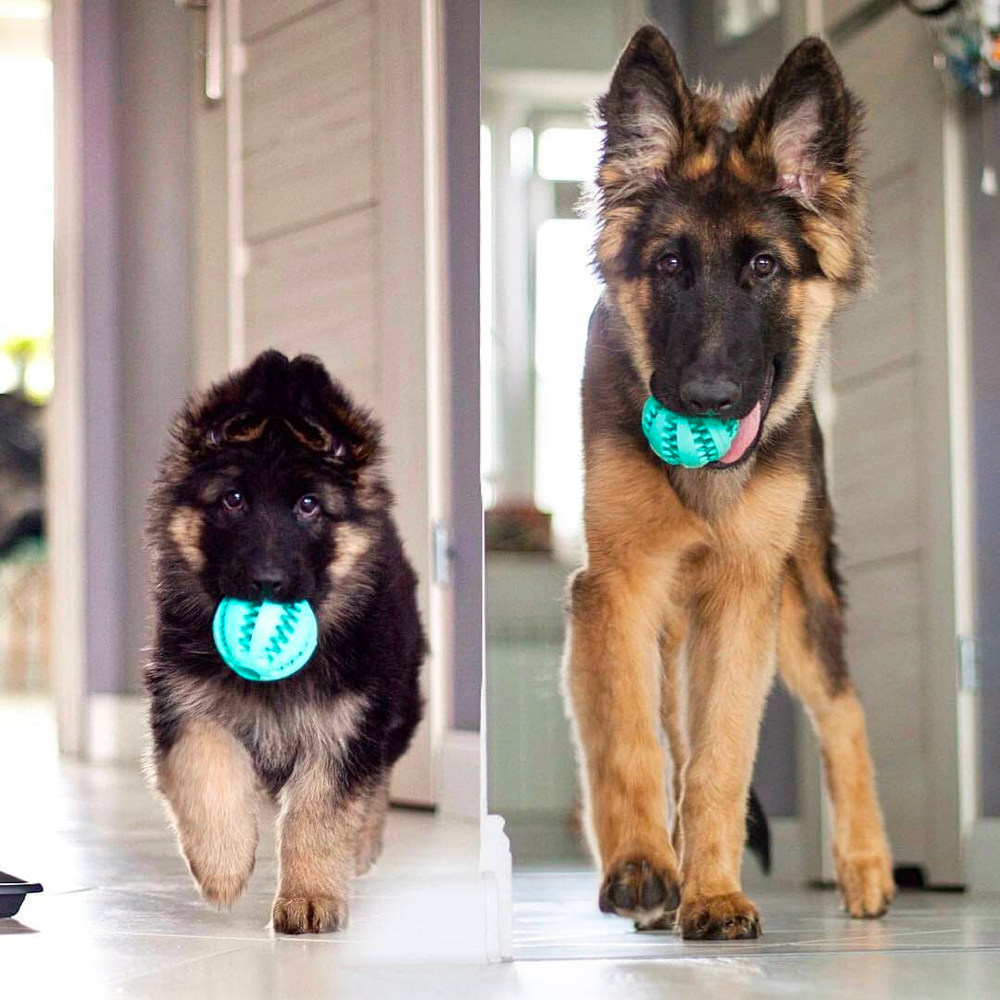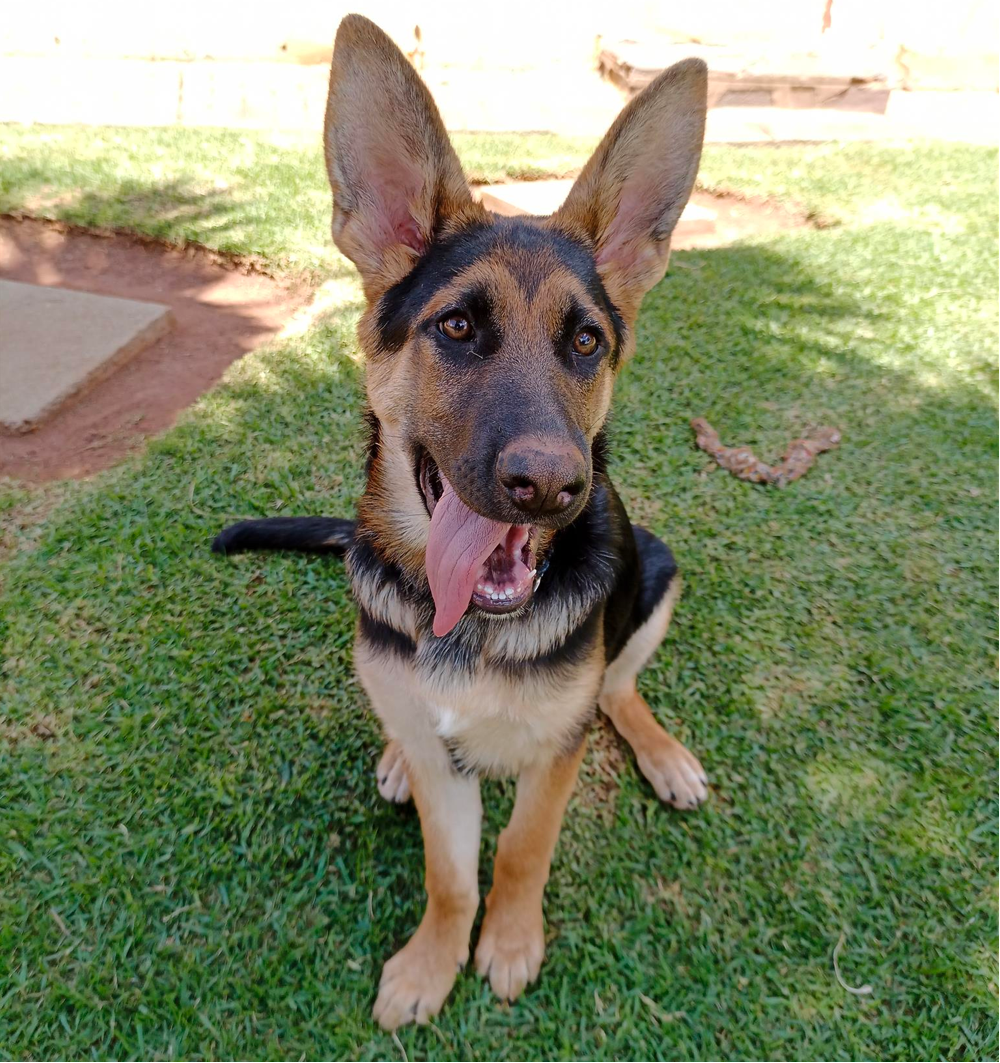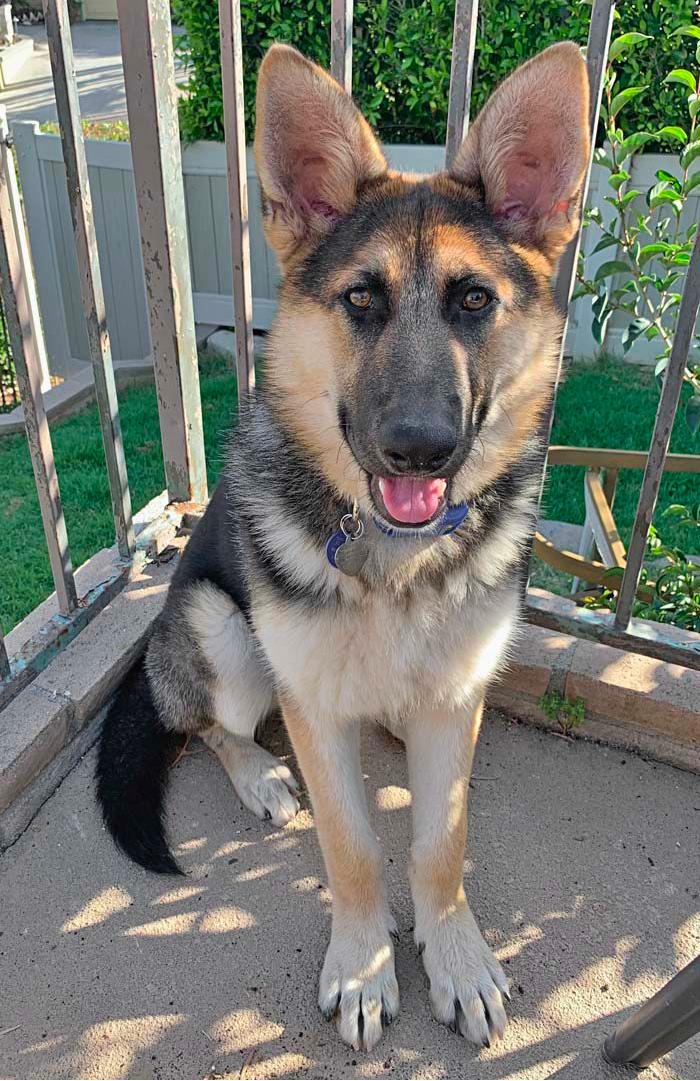Contents
- What To Expect From a 5-Month-Old German Shepherd Puppy
- Living With A German Shepherd at 5 Months Old
- How Big is A 5-Month-Old German Shepherd Puppy?
- How Much Food Should Your 5-Month-Old German Shepherd Puppy Eat?
- How Much Sleep Does A 5-Month Old German Shepherd Puppy Really Need?
- Exercising Your 5-Month-Old German Shepherd Puppy
- Training Your 5-Month-Old German Shepherd Puppy
- How Healthy Is a 5-Month-Old German Shepherd Puppy?
- Conclusion
After a month of proper care, your once 4-month-old German Shepherd puppy should now be 5 months old, curious, energetic, and a little calm in nature. At this age, your German Shepherd puppy should be wrapping up its juvenile (sometimes called ‘troublesome’ stage) and should be a month closer to being an adolescent German Shepherd.
The German Shepherd puppy should still be as cute as it was a month ago however, there should be a notable increase in the height, size, and appearance of the German Shepherd puppy as it should be a lot more mature than it did a month ago.
If you do happen to own a 5-month-old German Shepherd puppy, then this article provides you with the necessary information on what to expect with the young German Shepherd puppy. We would provide information on the overall appearance, behavioral changes, and traits as well as provide useful tips to help you with your puppy.
At 5 months of age, the German Shepherd puppy should still retain its highly energetic and playful nature, however, it would also be a lot more curious than before while still being slightly less troublesome than the 4 month German Shepherd.
Related posts:
- 8 Week Old German Shepherd: Loyal, Energetic, Active Canine Partner
- 3-Month-Old German Shepherd: A Busy, Active, Playful Ball of Energy
- 4-Month-Old German Shepherd: Cute, Active, Curious Puppy
- 6-Month-Old German Shepherd: Energetic, Curious, and Playful Puppy
What To Expect From a 5-Month-Old German Shepherd Puppy

One sure thing to look out for with a 5-month-old German Shepherd puppy is the overall change in appearance. The German Shepherd puppy at 5 months looks a lot less of a puppy and more of an adult than it looked at 4 months of age. Their ears should be a lot perkier and they should have a slight increase in overall size.
With an increase in physical maturity also comes an increase in mental maturity as the 5-month-old German Shepherd puppy should be clearly rounding up with its delinquent or troublesome phase and should be a little calmer than a month ago. This doesn’t mean that they won’t exhibit signs of immaturity or mischief, but the chances are a lot fewer.
Energy is another important factor to look out for in your 5-month-old German Shepherd. They should be a lot more energetic and would mostly need help with the release of this pent-up energy. If left alone for too long, your German Shepherd puppy might get into more mischief and could potentially be a handful to take care of.
Training and Exercise can be great ways to help the German Shepherd puppy get rid of all that pent-up energy. Not only does this help the German Shepherd get less destructive and a lot well behaved, but combining the right programs can help you keep your German Shepherd, sharp and a lot more resourceful.
Another more pronounced trait for the 5-month-old German Shepherd puppy is its curiosity trait. Just like the 4-month-old German Shepherd, the 5-month-Old German Shepherd should be very curious about its surroundings. This can cause them to wander off a lot and sometimes get into small accidents around the house.
Biting can continue for the German Shepherd puppy of 5 months old as it should still be teething at this stage of its life. The adult teeth should start becoming more and more pronounced, which is why good dental care is a necessity for this stage in the canine’s life. Frequent shedding should be expected at this stage in the puppy’s life.
Living With A German Shepherd at 5 Months Old

Living with a 5-month-old German Shepherd puppy should be a lot easier. Assuming you regularly visit a licensed vet, your puppy should have received most of its basic vaccinations, shots, and dewormings. If they haven’t by now, then consider taking them to a vet to be properly looked at.
At 5 months, you are required to pay close attention to your German Shepherd for evidence of its lingering delinquent or troublesome behavior. Most times this is caused by the excess amount of energy that is trapped in the body of this fantastic canine. It can show through a short burst of violent behaviors including barking or sometimes biting.
When this is noticed, the best way to handle this would be true proper training and exercise. Training should help to reduce the tendency or frequency of this troublesome behavior and exercises could easily tire the puppy out so it spends a lot of its time sleeping or resting up. But it’s not all bad, as this puppy should also be a lot more protective of its family at this time.
Regular grooming of your German Shepherd is also highly recommended. The transition to the full adult coat should almost be done, so your German Shepherd is expected to shed a lot during this stage in its development. Brush your puppy’s coat at frequent intervals during this period using a good, steel comb.
Socialization is also a lot easier during this stage as the 5-month-old German Shepherd puppy should be very much curious and eager to explore new surroundings, or terrains. With that being said, it is important that you provide a controlled space for the German Shepherd to explore freely.
How Big is A 5-Month-Old German Shepherd Puppy?

The actual increase in size from the 4 month German Shepherd to the 5-Month-Old German Shepherd is evident, but it is small. The German Shepherd further loses its puppy-like look and gains a more adult-like look.
For the Male German Shepherd puppy at 5 months of age, the expected weight should be between 45 to 50 pounds. This should total up to 60% of the entire adult German Shepherd puppy. The height of the Adult male German Shepherd puppy at months of age should be between 14 inches to 16 inches.
Whereas for the female German Shepherd puppy at 5 months of age, their weight and height should be a little smaller. It should be between 35 to 45 pounds in weight and about 12 inches to 14 inches in height. Again, this should total 60% of the entire adult female German Shepherd size.
Again, the exact size of the German Shepherd puppy at any age range can be influenced by a lot of different factors ranging from diet to breeding line and a lot more. Asides from the increment in size, there are other notable physical changes that would occur at the 5 months age range.
One of these physical changes would be the ears, the teeth, and the coat of the German Shepherd puppy. Its ears should be perky, if it isn’t you might need to consult with your vet as it is not normal. Also, the evidence of teething should be more pronounced, as your dog should lose more milk teeth in favor of new adult or fully mature teeth.
How Much Food Should Your 5-Month-Old German Shepherd Puppy Eat?
Your once small German Shepherd puppy should be a large dog by now and as such, its appetite should be a lot bigger than it was. Because its food consumption rate should be quite high, so should its nutrient intake be quite high. In summary, only focus on high-quality dog kibble for your 5-month-old German Shepherd puppy.
Invest in foods that are of high-quality brands or you can provide your German Shepherd puppy with natural foods that are healthy. This can include vegetables, fruits, and raw meat. Always ensure that junk food or cheap, toxic food should be avoided.
Another thing that is worth noting with German Shepherds at 5 months of age is the high propensity to obesity. This condition can be quite harmful to the German Shepherd puppy as it can lead to cancer, arthritis, diabetes, and even hypertension.
At this age, your puppy should be eating 3 to 4 times each day, with each meal serving 2 cups of high-quality kibble. Try to develop a feeding schedule if you do not already have one and be consistent with it. Ensure there is enough space between feeding times for the puppy to digest its meal properly.
Water is also quite important after each meal so ensure that clean and sufficient water is provided to each puppy’s feeding bowl. Also, ensure that the puppies have their last meal for the day hours before they eventually go to bed.
How Much Sleep Does A 5-Month Old German Shepherd Puppy Really Need?
German Shepherds at 5 months of age should require even less sleep than they did at 4 months of age. Still, sleep is still highly crucial as their bodies should be going through a lot of growth and development and as such need enough rest to be active.
Ideally, the 5-month-old German Shepherd puppy should be getting between 15 to 18 hours of full sleep in a day to be fully active. This means that nighttime sleep is heavily important and short sleep periods during the day are also highly important.
Avoid late-night feeding as it can terribly influence the sleep pattern of the German Shepherd puppy. You can force a puppy to sleep by regularly engaging them in exercises and training that easily tire them out.
Exercising Your 5-Month-Old German Shepherd Puppy
Most German Shepherd dog owners don’t know the importance of exercise and training in the lives of the German Shepherd dog. They are highly energetic canine breeds that are capable of storing enough energy within which can quickly turn destructive if not fully released or managed properly.
With that being said, you would need to commit to an exercise lifestyle for both you and your puppy. There are lots of ways you can achieve this. Set aside 30 minutes of your time each day to regularly engage in both mental and physical exercises with your beloved canine.
This can be done through regular 10 minutes walks around the neighborhood spread across three times a day and preferably under favorable security and weather conditions for the German Shepherd puppy.
Or engaging in activities like fetch or tag or swimming for your German Shepherd puppy for a period of 10 to 15 minutes each session twice or thrice each day. Always include mental exercises like puppy puzzles into their exercise schedule to keep them sharp and highly trainable.
Training Your 5-Month-Old German Shepherd Puppy

Training is a part of the German Shepherd life as they were originally bred to be working dogs. Asides from this, the German Shepherd puppy is naturally intelligent or smart and as such can be highly versatile with the right training program and training method.
By 5 months of age, you should have already rounded up with crate and potty training, leading to less frequent potty accidents by the German Shepherd puppy. If you haven’t already started this training, most definitely start them.
If you have already started them, then obedience training and biting inhibition training should be your next focus for your German Shepherd puppy. Biting is quite common for the German Shepherd puppy at this stage, so ensure you train them not to.
Obedience training can start with the learning and training on some basic words like ‘come’, ‘sit’, ‘hee’, ‘here’, and ‘stay’, amongst others. Try to make use of positive reinforcement during training sessions and be patient with your German Shepherd puppy.
How Healthy Is a 5-Month-Old German Shepherd Puppy?

By the 5th month, your German Shepherd puppy should be pretty healthy and strong. It should have gone through 3 different rounds of vaccinations and deworming and its last vaccination shot should have been taken at 16 weeks or 4 months. Moving forward, its next round of shots should be scheduled for 12 months of age.
It is recommended that you regularly check with your certified vet to be certain that your German Shepherd puppy did not skip any of the required vaccinations or dewormings. Also, try running thorough DNA tests on your puppy to be certain they are free from genetic health conditions which could prove fatal to the puppy.
Also, be on the lookout for a few symptoms like these on your 5-month-old German Shepherd Puppy:
- A decrease in appetite
- Changes in sleep patterns
- Diarrhea
- Swollen or red gums
- Changes in personality
- Skin dryness or itchiness
- Difficulty in urinating
- Weight loss
- Frequent thirst
- Excess sneezing or coughing
- Excess Urination
- Vomiting
- Runny nose or eyes
- Difficulty in breathing.
Conclusion

The 5-month age range marks the end of the delinquent or troublesome stage of the German Shepherd puppy. Moving forward, your puppy should be growing and stepping into its adolescent stage.
Care should be given to the German Shepherd puppy at this stage in its life. Always provide them with the necessary nutritional requirements, ensure they are properly groomed, and ensure they get enough exercise and rest.

 Top 6 Best White German Shepherd Breeders Within The United States
Top 6 Best White German Shepherd Breeders Within The United States